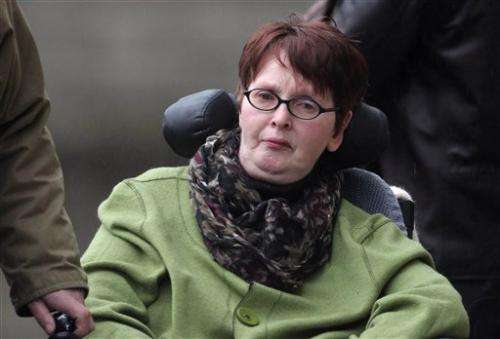Irish court: No 'right to die' for paralyzed woman (Update)

(AP)—A paralyzed Irish woman who wants to die cannot legally commit suicide with her partner's help, Ireland's Supreme Court ruled Monday in a case that moved some in the courtroom to tears.
The seven-judge court said nothing in the country's Catholic-influenced 1937 constitution could authorize the deliberate taking of a life on humanitarian grounds. It said lawmakers could pass such a law to permit 59-year-old Marie Fleming to die at a time of her choosing, but no such statute existed yet.
Fleming, a former University College Dublin lecturer who is unable to move from the neck down because of advanced multiple sclerosis, testified that her life had been reduced to irreversible agony and that she feared choking to death because she couldn't swallow.
Her lawyers argued that suicide was not a crime in Ireland, therefore a disabled person unable to end his or her own life should receive that help to be equal under the law. They also contended that Fleming's right to personal autonomy under the European Convention on Human Rights was being violated.
But Chief Justice Susan Denham said EU law permits nations to set their own policies on euthanasia, and the Irish constitution contains "no explicit right to commit suicide or to determine the time of one's own death."
As Denham read the judgment, Fleming's partner, Tom Curran, and the couple's three adult children cried and held hands. Fleming herself could not come to the courthouse because, Curran said, she was battling a chest infection that itself might prove lethal.
Outside afterward, Curran said he would help his partner die regardless of criminal penalties if she decided to proceed. After telephoning her to say the verdict was as they both had expected, Curran said the couple was determined to end her life at their home in County Wicklow south of Dublin. If charged and convicted of assisting suicide, Curran would face a maximum prison sentence of 14 years.
"It's very difficult to understand how a person with a disability can be deprived of something that's legally available to everybody else. For that not to be discriminatory under the constitution, that's something we fail to understand. The constitution is there to protect people like Marie and to give them solace that they will be looked after," Curran said.
"We will now go back to Wicklow and live our lives until such time as Marie makes up her mind that she's had enough. And in that case, the court will have an opportunity to decide on my future," he said.
The family's lawyers say they could appeal their case to the European Court of Human Rights in Strasbourg, France. But Curran said that might prove to be too great an ordeal for his partner.
Most of the world, like Ireland, has not legalized assisted suicide for terminally ill patients. Belgium, Luxembourg, the Netherlands and Switzerland have legalized the practice as have the U.S. states of Montana, Oregon and Washington, all under restricted circumstances.
When Fleming testified in court in December—she still can speak, though this ability is fading, with life-threatening choking episodes common—she said she contracted multiple sclerosis 24 years ago and gradually lost her ability to move. The incurable disease attacks the central nervous system and often proves fatal. Fleming said doctors told her she would eventually become mute and most likely die from asphyxiation.
She said she had seriously considered killing herself three years ago, when she could have done this on her own because her arms still had movement, but Curran persuaded her to desist. She said she now regrets that decision.
When she testified, the judges left their benches to sit beside her, because her voice was so frail. She described a daily regimen involving seven caregivers, having to be slapped in the back to stop sudden struggles against suffocation, and 2 ½-hour daily efforts to be showered that left her exhausted. She described recurring sensations of pain so searing that, she said, "I'm afraid my head will split open."
"When you have to be showered, toileted and fed, you start to feel like a nobody," she testified. "I want to go peacefully, in my own home, with the people I love around me."
The government-appointed Irish Human Rights Commission testified in support of her claim, while the government itself opposed her bid. And Catholic conservatives, opposed to euthanasia, welcomed the verdict.
"It's very important that we don't create a right to assisted suicide, because of the signal it sends out. We might normalize suicide," said David Quinn, director of a Catholic think tank in Dublin called the Iona Institute.
© 2013 The Associated Press. All rights reserved.


















